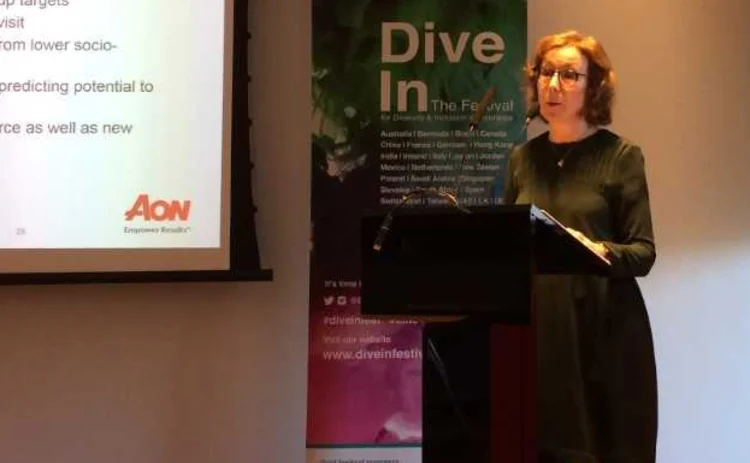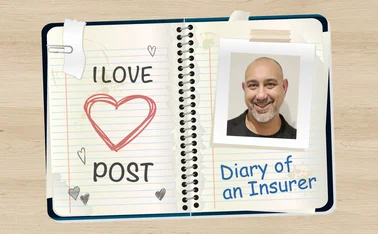
Dive In: Insurance companies urged to support social mobility

Human resources departments in the insurance industry need to start supporting social mobility in the same way they’ve been promoting gender balance and ethnic diversity, a Dive In panel heard.
Katherine Conway, head of diversity and inclusion and community affairs at Aon, argued that social class was being neglected.
“It’s not one of the protected characteristics of the 2010 Equality Act. So it often gets overlooked,” she told a gathering at the Leadenhall Building, in the City of London.
“It’s a real great driver of diversity of thought and perspective that we’re all trying to achieve in order to make our businesses more successful,” she added.
“We’ve made huge advances in addressing gender and ethnic inequalities, although there’s still far to go, but class is still a factor that persists.”
Warning participants against a “class ceiling”, Conway asked: “How do we help those working class young people who are less able to mobilise resources and support?”
Hiring practices need to be reviewed to focus on skills rather than academic background, she suggested. For instance, the names of candidates and/or schools can be removed from CVs. She urged companies to “explore ways of getting in touch with other universities that you currently don’t visit”.
“Analyse whether or not your recruitment process is accurately predicting the potential to do the job rather than just academic performance,” she added.
She mentioned a company that, for every placement it gives to the son or daughter of an employee or client, matches that by offering a similar opportunity to a young person from a less privileged background.
She also suggested making sure hiring panels are socially diverse.
“We do need to recognise that class and social backgrounds should be treated like a protected characteristic and our firms would greatly benefit from the diversity of thought that this bring,” said Conway.
Adrian Johnson, senior consultant at Aon, then introduced the firm’s traineeship programme, Step Up, saying it had “expanded the talent pool almost overnight”. In the first cohort, seven people aged 18 to 25 had four weeks classroom education and four weeks of work experience in Chelmsford, gaining skills and the possibility to get a job.
One of them, Matilda Allen, now a sales adviser, described the scheme as “a chance to get the foot in the door and start out”. She said that before doing the traineeship, if she’d seen her current position advertised, she wouldn’t have dared apply for it. “I thought my lack of office experience would be obvious,” she recalled, confiding her main struggle during the programme was to get into a nine to five routine and making sure to get a good night sleep every night. She said she liked her job: “I enjoy coming into work every day. My manager is very good at breaking down the work for me in a way that’s not intimidating.”
Further reading
Only users who have a paid subscription or are part of a corporate subscription are able to print or copy content.
To access these options, along with all other subscription benefits, please contact info@postonline.co.uk or view our subscription options here: https://subscriptions.postonline.co.uk/subscribe
You are currently unable to print this content. Please contact info@postonline.co.uk to find out more.
You are currently unable to copy this content. Please contact info@postonline.co.uk to find out more.
Copyright Infopro Digital Limited. All rights reserved.
As outlined in our terms and conditions, https://www.infopro-digital.com/terms-and-conditions/subscriptions/ (point 2.4), printing is limited to a single copy.
If you would like to purchase additional rights please email info@postonline.co.uk
Copyright Infopro Digital Limited. All rights reserved.
You may share this content using our article tools. As outlined in our terms and conditions, https://www.infopro-digital.com/terms-and-conditions/subscriptions/ (clause 2.4), an Authorised User may only make one copy of the materials for their own personal use. You must also comply with the restrictions in clause 2.5.
If you would like to purchase additional rights please email info@postonline.co.uk







